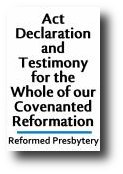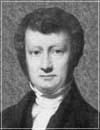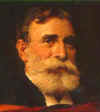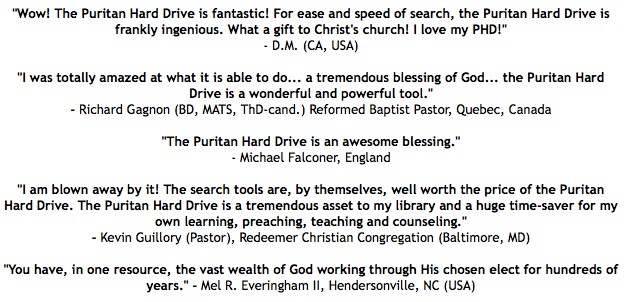 Loading... Please wait...
Loading... Please wait...- SWRB Home
-
Free Resources
- Short Listings Of Free Reformation & Creation Resources
- Free Reformed, Puritan, Covenanter and Creationist Videos
- Thousands of Links to Free Audio, Video and Printed Resources
- Free Puritan Books, Reformed MP3s, and Calvinist Videos
- Puritan Quotes, Free Reformation MP3s, Reformed Books and Calvinist Videos From PuritanDownloads.com On FaceBook
- Shipping & Returns
- Blog
- Privacy Policy
- Contact Us
- Payment Options
- Help
-
About Us
- Sitemap
Pastor Scott Brown, on the left in the video above, is the Director of the National Center for Family-Integrated Churches (NCFIC)
Resource Categories
- PURITAN HARD DRIVE REVIEWS
- PASTOR ROB VENTURA ON THE PURITAN HARD DRIVE
- DR. VODDIE BAUCHAM, JR. ON THE PURITAN HARD DRIVE
- R. C. SPROUL ON SWRB
- DR. JOEL R. BEEKE ON THE PURITAN HARD DRIVE
- PASTOR GREG L. PRICE ON THE PURITAN HARD DRIVE
- DR. MATTHEW MCMAHON ON THE PURITAN HARD DRIVE
- PASTOR SCOTT BROWN ON THE PURITAN HARD DRIVE
- PASTOR W. J. MENCAROW ON THE PURITAN HARD DRIVE
- JOAQUIN FERNANDEZ ON THE PURITAN HARD DRIVE
- PASTOR DAVID SILVERSIDES ON THE PURITAN HARD DRIVE
- JOHN HENDRYX ON THE PURITAN HARD DRIVE
- PASTOR KEVIN GUILLORY ON THE PURITAN HARD DRIVE
- RICHARD BENNETT ON THE PURITAN HARD DRIVE
- DR. KENNY RHODES ON THE PURITAN HARD DRIVE
- JUSTIN RAWSON ON THE PURITAN HARD DRIVE
- PASTOR JAMES WALLACE ON THE PURITAN HARD DRIVE
- PASTOR RICHARD GAGNON ON THE PURITAN HARD DRIVE
- PASTOR JOE HAYNES ON THE PURITAN HARD DRIVE
- DR. STEVEN DILDAY ON THE PURITAN HARD DRIVE
- PASTOR ANDREW COMPTON ON THE PURITAN HARD DRIVE
- TERENCE ELLARD ON THE PURITAN HARD DRIVE
- PASTOR JERRY JOHNSON ON THE PURITAN HARD DRIVE
- PASTOR DAVID PETRIE ON THE PURITAN HARD DRIVE
- JIM DODSON ON THE PURITAN HARD DRIVE
- PASTOR BRIAN SCHWERTLEY ON THE PURITAN HARD DRIVE
- PASTOR PHIL GIBSON ON THE PURITAN HARD DRIVE
- MEL R. EVERINGHAM II ON THE PURITAN HARD DRIVE
- PAUL BLYTH ON THE PURITAN HARD DRIVE
- STEVE KETTLER ON THE PURITAN HARD DRIVE
- D. M. (CALIFORNIA) ON THE PURITAN HARD DRIVE
- MICHAEL CAUGHRAN ON THE PURITAN HARD DRIVE
- WIILIAM NOPPER IV ON THE PURITAN HARD DRIVE
- LINDA THERIAULT ON THE PURITAN HARD DRIVE
- WILLIAM WARNOCK ON THE PURITAN HARD DRIVE
- ROBERT KOH ON THE PURITAN HARD DRIVE
- WHAT'S ON THE PURITAN HARD DRIVE?
- ALL PURITAN HARD DRIVE VIDEOS
- PHD-ODE INSTALLATION VIDEOS
- COMMENTS ON SWRB
- ALL PURITAN QUOTE VIDEOS
- PURITAN HARD DRIVE SCREENSHOTS
- PURITAN HARD DRIVE MINISTRY AND DONATION OFFERS
- TABLE OF RESOURCE CATEGORIES
- Advanced Studies
- SWRB SERMONAUDIO MOBILE APP
- Apologetics
- Assurance
- Attributes and Holiness of God
- Augustine
- Banner of Truth
- Baptism
- Beginners
- Bibles (Geneva, KJV, Hexapla, etc.)
- Biblical Counseling
- BIBLICAL HD COLLECTION
- Biblical Interpretation (Hermeneutics)
- Biographies and Autobiographies
- Calvinism and the Sovereignty of God
- CALVINISM HD COLLECTION
- CALVINIST CLASSICS HD COLLECTION
- Charles Spurgeon
- Children's Books
- CHRISTIAN EDUCATION HD COLLECTION
- Christian History
- Church Government
- Civil Government and Resistance
- CLASSIC CHRISTIAN HD COLLECTION
- Classic Puritan and Reformed Sets
- Commentaries
- Contemporary Issues
- Covenant Theology and Covenanting
- COVENANTER HD COLLECTION
- Covenanters and Covenanted Reformation
- Creation and Creationism
- Creeds, Confessions and Covenants
- Cults, False Religions, Psychology, Humanism
- Dealing with Affliction, Suffering, and Sickness
- Debates
- Dutch Reformed
- Education and Home Schooling
- English Puritans, Covenanters and Reformers
- Family, Children, Home, and Family Worship
- First Reformation
- Five Points of Calvinism (TULIP)
- For Pastors and Elders
- For Seminary Students
- FREE PURITAN & REFORMATION MP3 AUDIO SERMONS/BOOKS
- FREE PURITAN BOOKS, REFORMATION MP3s, PDFs, VIDEOs
- George Gillespie
- God's Law, The Ten Commandments, etc.
- Greg L. Price on Headcoverings
- Heaven, Hell and the Final Judgment
- Holy Days (Lord's Day, Christmas, Easter, etc.)
- HOME SCHOOL HD COLLECTION
- Intermediate Studies
- John Bunyan
- John Calvin
- John Knox
- John Owen
- Jonathan Edwards
- Justification
- Languages, Dictionaries, Reference, etc.
- LOOK WHO LOVES THE PURITAN HARD DRIVE
- Lord's Supper (Communion)
- Marriage, Courtship, etc.
- Martin Luther and Lutheranism
- Martyrs and Persecution
- Other Protestant Works
- Predestination and Providence
- PRESBYTERIAN HD COLLECTION
- Presbyterians and Presbyterianism
- Prophecy, Antichrist, and Eschatology
- PROTESTANT HD COLLECTION
- PSALM SINGING MP3s (COMPLETE SET)
- Psalters, Psalm Singing and Music
- Puritan Facts
- PURITAN FAST SERMONS (1640-1653) - 34 VOLS SET
- Puritan Fast Sermons 1640-1653
- PURITAN HARD DRIVE
- Puritans and Puritanism
- REFORMATION HD COLLECTION
- Reformation History
- Reformed and Puritan Classics
- Reformed Baptist
- REFORMED BAPTIST HD COLLECTION
- REFORMED HD COLLECTION
- REFORMED PRESBYTERIAN HD COLLECTION
- Reformed Presbytery, RPNA Protesters, etc.
- Reformed Theology
- Reformed Worship, The Regulative Principle, etc.
- Roman Catholicism, the Jesuits, Islam, etc.
- Salvation and Evangelism
- Samuel Rutherford
- Sanctification, Prayer and Holiness
- Scottish Covenanters
- Scottish Presbyterianism
- Scripture Song MP3s (Psalms and Bibles Verses)
- Second Reformation
- Separation, Unity, Uniformity, etc.
- Sermons and Sermon Collections
- Solemn League and Covenant
- Theology and Doctrine
- Third Reformation
- Thomas Watson
- Westminster Confession, Assembly and Divines
- Authors (All A to Z)
Popular Authors
Phone Orders:
(780) 450-3730
To obtain free Reformation books, Puritan MP3s and Calvinistic videos, SWRB discount coupons, etc., add yourself to SWRB's Puritan and Reformed email list by using the form above.
- Home
- PRESBYTERIAN HD COLLECTION
PRESBYTERIAN HD COLLECTION
Bible believing Presbyterians have always been the theological leaders of the church.
From Old Testament Presbyterians (cf. Dr. Francis Nigel Lee's fascinating book, John Owen Re-Presbyterianized, especially pages 2-13 in this book) to first century Presbyterians (like Peter and Paul) to the magnificent Solemn League and Covenant, which led to the Westminster Standards (the Westminster Confession of Faith, the Westminster Shorter Catechism, the Westminster Larger Catechism, etc.) - the greatest statement of the Christian Faith outside the Bible - faithful biblical theology is virtually synonymous with the best of Bible believing Presbyterian theology. I use the words "Bible believing" in front of Presbyterian, because (sadly) there are groups of people who do not believe the Bible who nevertheless still use the name "Presbyterian."
Presbyterian theological leadership throughout history is also one of the reasons why so many resources by Bible believing Presbyterians are found on the Puritan (Presbyterian) Hard Drive. This is also why, in part (as Bible believing theologians and ministers other than Presbyterians have also played an important role in discovering and teaching certain truths of the Bible), the Puritan Hard Drive contains so much of the best theological literature (PDF books and MP3s), and sermons (books, MP3s and videos) ever - among the over 12,500+ Puritan, Reformation (Reformed) and Presbyterian resources it contains.
Interestingly, if a second name was to be given to the Puritan Hard Drive, Presbyterian Hard Drive would have been one of the top contenders, because so many Presbyterian books, Presbyterian sermons and Presbyterian videos make up its contents. However, "Puritan Hard Drive" is more inclusive as a name for all the works and authors on the Hard Drive, rather than the name "Presbyterian Hard Drive," especially if the broader and more historically correct definition of "Puritan," which clearly included Presbyterians, is kept in mind.
For a good example of Presbyterians being called Puritans in the seventeenth century, Dr. Joel Beeke and Randal Pederson, in their important book, Meet The Puritans: With a Guide to Modern Reprints (2006), on page 646 (in Appendix 2 on the "Scottish Divines"), quote Iain H. Murray from The Puritan Hope: Revival and the Interpretation of Prophecy, on pages xxiv-xxv, where Murray writes,
I make no apology for treating the Scots under the general term "Puritan." It is sufficient justification that the word was used in reference to the Scots in the seventeenth century itself. For example, Robert Boyd, Principal of the Glasgow College, was charged with being a Puritan in 1621 and Samuel Rutherford preaching in Scotland, probably in the 1630s, says, "Many are ashamed to own Christ, and to profess him, they will not be called Puritans" (Fourteen Communion Sermons, 1876 edition, p. 341). Peter Heylyn was therefore not creating a precedent when in his History of the Presbyterians, published in 1670, he speaks of "the Presbyterians or Puritan Faction in the realm of Scotland."
If you have a burning desire to know God more intimately, and to understand biblical truth with more certainty and assurance, you will need to read and research the best Presbyterian literature and sermons - especially the leading Scottish and English (Puritan) Presbyterians around the time of the Westminster Assembly (a good example being the 34 volume set of Puritan [Westminster, Covenanter] Fast Sermons, which is available on the Puritan Hard Drive), the leaders of the Covenanted Scottish General Assembly during its most faithful periods (in classic Presbyterian books like The Records of the Kirk of Scotland, Containing the Acts and Proceedings of the General Assemblies, From the Year 1638 Downwards, As Authenticated by the Clerks of Assembly; With Notes and Historical Illustrations) and the Covenant keeping Scottish Protesters (like Samuel Rutherford, James Guthrie, William Guthrie, Richard Cameron, Donald Cargill, James Renwick, Robert Triall, et al.).
Thankfully, the Lord has ordained that reading the best Presbyterians (some who were martyred for their great love for the Lord), or listening to and/or watching their sermons, just got a lot easier. Now you can get the very best of Presbyterian and Puritan books, MP3s and videos (from the past right up to our day), all in one convenient, easy-to-use and extensive Presbyterian study tool, in SWRB's new Puritan (Presbyterian) Hard Drive.
Know the Most High (Psalm 92:8) better than ever before, through the very best in faithful biblical theology - get your Puritan (Presbyterian) Hard Drive today!
"Wisdom is the principal thing; therefore get wisdom: and with all thy getting get understanding" (Proverbs 4:7).
Presbyterian Quotes
 |
"The Westminster Standards (including the Confession of Faith and Catechisms) were the fruit of the covenanted uniformity aimed at in the Solemn League and Covenant. The relationship between the Westminster Standards and the Solemn League and Covenant is so close, in fact, that to truly adhere to the Standards requires that an individual or church (or nation -ed.) also adhere to the Solemn League and Covenant. In other words, all true Presbyterians must also be Covenanters. This is clear from 'The Directory for the Ordination of Ministers' in the original (1648) Westminster Standards' 'Form of Presbyterial Church-Government' where it says that every candidate for the ministry must 'bring with him a testimonial of his taking the Covenant of the three kingdoms,' i.e., the Solemn League and Covenant. All faithful Presbyterian ministers must adhere to the Covenant. As well, the General Assembly of the Church of Scotland ruled in 1648 'that all young students take the covenant at their first entry to colleges; and that hereafter all persons whosoever take the covenant at their first receiving the sacrament of the Lord's supper.' In other words, people who would not take the Covenant could not partake of the Lord's supper." - Dr. Michael Wagner, Up From Reconstructionism; or, A Short History of the Puritan Reformed Church of Edmonton, 1996. |
 |
That Presbyterial Church Government and manner of worship are alone of divine right and unalterable; and that the most perfect model of these as yet attained, is exhibited in the Form of Government and Directory for Worship, adopted by the Church of Scotland in the Second Reformation. - The Six Points of the "Terms of Ministerial and Christian Communion in the Reformed Presbyterian Church" as listed at the end of The Act, Declaration, and Testimony for the Whole of Our Covenanted Reformation by the Reformed Presbytery, 1761, 1876, (1995, SWRB). |
 |
For more on divine right (biblical) Presbyterian church government and the particular Reformed Presbyterian (Covenanter) term of communion above, please listen to the two free MP3s by Greg Price entitled "Covenanter Terms of Communion 8 of 19: Presbyterian Worship and Government 1/2"at http://www.sermonaudio.com/sermoninfo.asp?SID=1260514421 and "Covenanter Terms of Communion 9 of 19: Presbyterian Worship and Government 2/2" at http://www.sermonaudio.com/sermoninfo.asp?SID=12705112647 |
 |
William Cunningham's comments on the Apostolic, Presbyterian general assembly held in Acts 15 follow, excerpted from his Historical Theology (volume one, pp.43-47). "Although our review of Theological Discussions properly begins at the close of the apostolic age, yet there is one transaction recorded in the New Testament to which it may be proper to advert to, from its intimate connection with the whole subsequent history and government of the church, and with the controversies to which they have given rise, many of them continuing down to the present day. I allude to what is commonly called the Council of Jerusalem, recorded in the fifteenth chapter of the Acts of the Apostles. There has been a very great deal of discussion about the true character of this transaction, and the lessons, if any, which it is fitted to suggest respecting the government of the church in subsequent ages. Papists, Prelates, and Presbyterians have usually held that it was fitted and intended to convey some instruction as to the way and manner in which the government of the church should be permanently conducted, and have all professed to find in it something to favour their respective systems; while the Congregationalists, not being able to find in it anything to favour their views of church government, have generally contented themselves with maintaining that it does not afford any clear or certain materials for determining in what way the government of the church should be conducted in subsequent ages. Papists, finding it recorded here that Peter took a prominent part in the discussion which arose upon this occasion, adduce the narrative as a proof that he acted then, was entitled to act, and was recognized as entitled to act, as the vicar of Christ and the head of the church. Prelatists, finding that, several centuries afterwards, the notion was broached that James was appointed by the apostles Bishop of Jerusalem, profess to get scriptural evidence of this fancy in the prominent part which he took in the discussion. There is not in the narrative a trace of any superiority in office or jurisdiction on the part of Peter or James; so that the substance of the Popish argument is virtually this,-Peter spoke first, and therefore he was superior in authority and jurisdiction to the other apostles; while the Prelatic argument is,-James spoke last, and gave shape to the decision of the council, and therefore he was diocesan bishop, and, as such, superior in some respects even to the apostles. This of course, is sheer trifling; and the only question of real importance or difficulty connected with this matter, lies between the Presbyterians and the Congregationalists or Independents. The Congregationalists usually contend that this transaction was so peculiar and extraordinary as to afford no pattern or precedent for the disposal of theological controversies, and the regulation of ecclesiastical affairs in subsequent ages, and in ordinary circumstances; while Presbyterians deny this, and allege that it affords a warrant for the general substance of some of the leading features of Presbyterian church government. The question whether or not the transaction was so peculiar and extraordinary as to afford no model or precedent for the subsequent government of the church, is virtually identical with this one,-whether the apostles acted in this matter as inspired and infallible expounders of the will of God, or simply as the ordinary office-bearers of the church, using the ordinary means of ascertaining the divine will, and enjoying the ordinary guidance and influences of His Spirit. Presbyterians contend that there are plain indications in the New Testament that the apostles sometimes acted in the administration of ecclesiastical affairs, not as inspired men directed by the infallible guidance of the Spirit which they enjoyed in declaring truth and in organizing the church, but simply as ordinary office-bearers in co-operation with other elders, and more especially that they acted in this capacity merely in this case; and Congregationalists, not absolutely denying, and yet not prepared to admit, that they never acted in the administration of ecclesiastical affairs without infallible guidance, strenuously contend that in this case they acted under the influence of immediate supernatural inspiration, which infallibly guided them to a right decision, and that therefore it affords no model or precedent for the church in future times. It seems very manifest, from the whole scope and strain of the narrative, that the apostles did not act here as inspired and infallible men, but simply as ordinary ecclesiastical office-bearers, in conjunction with the elders and ordinary pastors. Had it been the purpose of God to settle the controversy which arose about the necessity of circumcision by an inspired infallible decision, the apostles might have at once decided it without meeting, and without discussion of any kind; or any one of them might have done so in the exercise of his apostolic authority, and confirmed his decision by the "signs of an apostle." Paul himself might have done so at Antioch, without the matter being brought up to Jerusalem at all. This was not done; the matter was brought up to the church at Jerusalem. The apostles and elders assembled to deliberate upon it publicly in the presence of the people; and we are expressly told that much disputing took place regarding it, when they were assembled to decide it. The apostles who took part in the discussion, in place of at once declaring authoritatively what was the mind and will of God regarding it, formally argued the question upon grounds derived at once from God's providential dealings, and from statements of scripture. In this way, and by this process, they carried conviction to the understandings of all who heard them, so that they concurred at length in an unanimous decision. Here everything plainly indicates, and seems to have been obviously intended to indicate, that inspiration was not in exercise, but that the matter was decided by means accessible to men in general under the ordinary guidance of the Spirit. There is no evidence, indeed - and the Congregationalists found much on this consideration - that any of the apostles were, even at the first, of a different mind from that in which the whole assembly ultimately concurred, or that they had any disputing among themselves; but it is certain-and this is sufficient to warrant our conclusion-that there was much disputing, i.e., argument on opposite sides, in the assembly in their presence; and that they did not put an end to this disputing by an immediate and infallible declaration of the mind of God upon the point, in the exercise of their apostolic authority, but by ordinary arguments derived from admitted principles, and addressed to the understandings of those who heard them. The only thing that appears to contradict the conclusion to which the whole scope and strain of the narrative obviously points, is the fact that the decision to which the assembly ultimately came is announced in these words: "It seemed good to the Holy Ghost and to us." Now, this statement certainly implies that they were confident that the decision was de facto in accordance with the mind of the Holy Ghost, but it does not necessarily imply more than this; and therefore it should not be held to imply more, as it would then contradict the general scope and strain of the narrative, which are plainly fitted to teach us that Christ, the Head of the church, determined the disposal of this matter, not by direct and infallible inspiration, but by a general meeting of apostles and elders seeking and attaining the truth upon the point, by means accessible to men in general with the ordinary influences of the Spirit. Not only does the expression, "it seemeth good to the Holy Ghost and to us," not necessarily imply more that the certain accordance de facto between the decision given by them and the mind of the Spirit, but it seems of itself to indicate that there was something in the case different from a mere declaration of what they knew simply as inspired men. It seems much more natural that if they had been simply declaring what they had been miraculously and supernaturally taught upon the point by the Spirit, they would have said only,"it seemeth good to the Holy Ghost;" the addition,"and to us," having the appearance of intimating that they did not act in the matter merely and solely as the inspired declarers of His mind, though confident that their decision was accordant with His. We hold it, then to be clear, that while the apostles ordinarily had the gift of supernatural infallible inspiration in the discharge of their public duties, in declaring the truth and in organizing the church, yet on this occasion they did not, in point of fact, exercise this gift, but left it as it were in abeyance, and acted in the matter just as uninspired men might and could have done. Now, these two facts taken in combination, not only prove that this transaction may afford a pattern and precedent for the proceedings of the church ordinarily in similar circumstances, but also warrant us to believe that it was expressly arranged in this way for that very purpose, and that therefore it is the church's duty to apply it for the regulation of her conduct. We assume now, then, that the view generally taken by Congregationalists, as to this controversy having been decided by a supernatural exercise of infallible inspiration, is erroneous. We assume that the whole transaction must have been intended and fitted to convey instruction to the church as to the management of its affairs." Dr. Reg Barrow comments: Scriptural uniformity can easily be seen in the "apostolic" Presbyterian general assembly at Jerusalem (cf. Acts 15). In fact, this general assembly "delivered decrees" that were binding on all the individual churches that were part of the one visible church which adhered to apostolic doctrine. The Greek word used in Acts 16:4 for "decrees" is "dogmata." Compare this with the word "decree" used in Luke 2:1. This same word as used in Luke 2:1 is referring to the decree of Caesar Augustus regarding his call for an empire wide census. This was not a suggestion given by Caesar, nor was it just advice that could be ignored without penalty - it was law! In the same way the decree sent down by the general assembly that took place in Acts 15 was to be held as law for the church. Furthermore, these pronouncements (because in keeping with the mind of the Spirit) held sway over all the churches. These decrees were carried out from Jerusalem to the churches in the cities of Asia Minor, as well as Antioch, indicating that the scope of the synod's authority extended not only over the church at Antioch which made the initial request, but over ALL THE CHURCHES! (Adapted from "Presbyterianism and Independency" in British Reformed Journal, No. 11, July-Aug. 1995, p. 10n). It is also interesting to note the comments found in this same Journal comparing the Presbyterian's Westminster Confession (1647) with the Independent's Savoy Declaration (1658). The British Reformed Journal points out: "A perusal of the twin columns on the page opposite will yield a direct contrast, highlighted at apposite critical points by the words in heavy type. One sees Westminster's decree (31:3), which corresponds to the Greek dogmata of the Textus Receptus in Acts 16:4, juxtaposed with advice given in the Savoy article XXVI, which latter corresponds with nothing anywhere in the Textus Receptus with respect to the matters of Synodical Church Government" (p. 17). Later this Journal asks: "Does this Scriptural Synod issue decrees or advice? Scripture says decree, Westminster says decree, Savoy says advice. Which Confessional standard is therefore Scriptural?" "And as they went through the cities, they delivered them the decrees for to keep, that were ordained of the apostles and elders which were at Jerusalem. And so were the churches established in the faith, and increased in number daily" (Acts 16:4-5). - William Cunningham and Dr. Reg Barrow, Apostolic Presbyterianism
|
 |
Concerning the Westminster Shorter Catechism, A.F. Mitchell, in his Westminster Assembly: Its History and Standards, notes, "...it is a thoroughly Calvinistic and Puritan catechism, the ripest fruit of the Assembly's thought and experience, maturing and finally fixing the definitions of theological terms to which Puritanism for half a century had been leading up and gradually coming closer and closer to in its legion of catechisms" (p. 431). Richard Baxter said of Westminster Shorter Catechism, "It is the best Catechism I ever saw - a most excellent sum of the Christian faith and doctrine, and a fit test to try the orthodoxy of its teachers." - Benjamin B. Warfield, "The Significance of the Westminster Standards as a Creed," (1897). |
 |
In his short work, PALEOPRESBYTERIANISM VERSUS NEOPRESBYTERIANISM (available for free download and online at http://www.swrb.com/newslett/actualNLs/paleo.htm), Dr. Michael Wagner defines the major differences between "paleo" or old Presbyterianism (the position found in original Westminster Standards written during the second Reformation in the seventeenth century) and "neo" or new (modern) Presbyterianism. In this book he maintains and proves that the two major differences are found in the form of subscription (whether complete [or "strict subscription - ed.], as with the "paleo's," or loose [i.e. allowing for scruples], as with the "neo's") to the Westminster standards and in whether or not the Solemn League and Covenant is thought to be binding today (on this last point see Greg Price's splendid 21 sermon series, free at http://www.sermonaudio.com/go/13073, entitled "A Biblical and Historical Defense of Covenanting and The Solemn League and Covenant [SL&C] - and Who The SL&C Binds Today, Including Individuals, Churches and Even Nations Like England, Scotland, Ireland, the USA, Canada, Australia, etc." - the complete series is a true Covenanter classic!). Dr. Wagner also further demonstrates how neopresbyterians have turned away from the original Presbyterian (biblical) position with far-reaching implications for those still in churches promoting neopresbyterian. - Short SWRB book summary of Dr. Michael Wagner's PALEOPRESBYTERIANISM VERSUS NEOPRESBYTERIANISM. |
Dr. Joel R. Beeke Reviews and Recommends
the Puritan Hard Drive

Dr. Joel R. Beeke, Puritan Reformed Theological Seminary
The Puritan Hard Drive is a massive collection of primary Puritan resources, dozens of which are very hard to find anywhere else in the world.
Any lover of Puritan literature, which, more than any other body of literature ever written, powerfully expands our minds, convicts our consciences, allures our hearts, and moves our hands, will find a treasure trove here.
- Dr. Joel R. Beeke, President and Professor of Systematic Theology and Homiletics at Puritan Reformed Theological Seminary https://puritanseminary.org/, Author of many important Reformed books (including the must read, Meet the Puritans: With A Guide to Modern Reprints, https://www.heritagebooks.org/products/Meet-the-Puritans.html), Editorial Director at Reformation Heritage Books, Editor of the Banner of Sovereign Grace Truth magazine and Pastor of Heritage Netherlands Reformed Congregation in Grand Rapids, Michigan, USA.
VIDEO INTRODUCTION TO THE PURITAN HARD DRIVE


Phone Orders:
(780) 450-3730
To obtain free Reformation books, Puritan MP3s and Calvinistic videos, SWRB discount coupons, etc., add yourself to SWRB's Puritan and Reformed email list by using the form above.
Current Top Sellers
-
1
-
2
All Authors
- Abernethie, Thomas
- Adams, Richard
- Adams, Thomas
- Alexander, Archibald
- Alleine, Joseph
- Ames, William
- Anderson, George
- Anderson, James
- Anderson, John
- Anderson, William
- Annesley, Samuel
- Anonymous
- Apple
- Arrowsmith, John
- Ash, Simeon
- Associate Presbyterian Magazine
- Associate Presbytery of Miami
- Augustine, Aurelius
- Bailllie, Robert
- Baird, Henry
- Balfour, William
- Bannerman, Douglas
- Bannerman, James
- Barker, Matthew
- Barnes, Albert
- Barrow, Reg
- Bates, Stewart
- Bates, William
- Baxter, Richard
- Bayly, Lewis
- Baynes, Paul
- Beaton, Donald
- Begg, James
- Beveridge, James
- Beza, Theodore
- Bining, Hugh
- Binnie, William
- Black, John
- Blaike, Alexander
- Blakeney, Richard P.
- Boettner, Loraine
- Bolton, Samuel
- Bond, John
- Boston, Thomas
- Bowles, Oliver
- Bradford, John
- Brainerd, Thomas
- Breckenridge, Robert J.
- Bredenhof, Wes
- Bridge, William
- Bridges, Charles
- Bridges, Walter
- Bromhall, Andrew
- Brooks, Thomas
- Brown (of Bedford), John
- Brown (of Edinburgh), John
- Brown (of Haddington), John
- Brown (of Wamphray), John
- Brown, C. J.
- Brown, David
- Brown, Henry
- Brown, P. Hume
- Brown, Thomas
- Bruce, Robert
- Buchanan, James
- Bullinger, Henry
- Bunyan, John
- Burgess, Anthony
- Burgess, Cornelius
- Burgon, John W.
- Burns, William C.
- Burroughs, Jeremiah
- Byfield, Richard
- Calamy, Edmund
- Calderwood, David
- Calvin, John
- Cameronian
- Cardell, John
- Carslaw, W. H.
- Carter, Thomas
- Carter, William
- Caryl, Joseph
- Case, Thomas
- Cawdrey, Daniel
- Chalmers, Thomas
- Chambers, Humphrey
- Chaney, James M.
- Charnock, Stephen
- Cheynell, Francis
- Chiniquy, Charles
- Chrystie, James
- Church of Scotland General Assembly
- Clarkson, Andrew
- Clarkson, David
- Close, Albert
- Cokayn, George
- Coleman, Thomas
- Coles, Elisha
- Colquhoun, John
- Commissioners, Scottish
- Conant, John
- Cooper, William
- Corbett, Edward
- Covenanted Ministers of Scotland
- Covenanted Reformed Presbyterian Publishing
- Covenanter Magazine
- Cradock, Walter
- Craighead, Alexander
- Croskery, Thomas
- Crumpler
- Cudworth, Ralph
- Cudworth, William
- Cunningham, John
- Cunningham, William
- Dabney, Robert Lewis
- Dale, James W.
- Darling, James
- Davies, Samuel
- Defoe, Daniel
- Dell, William
- Demaus, Robert
- Dexter, Henry Martin
- Dick, James
- Dick, John
- Dickinson, Jonathan
- Dickson, David
- Doolittle, Thomas
- Douglas, Thomas
- Dunlop, William
- Dunn, Samuel
- Durham, James
- Durye, John
- Edwards, Jonathan
- Edwards, Thomas
- Elgato
- Elliott, E. B.
- Ellis, John
- Enock, Esther
- Erskine, Ebenezer
- Erskine, Ralph
- Evance, Daniel
- Faber, George
- Fairbairn, Patrick
- Fairclough, Richard
- Fairley, John
- Ferguson, James
- Fisher, James
- Flavel, John
- Fleming, David Hay
- Fleming, Robert
- Forrester, Thomas
- Foster, J. M.
- Fowler, Christopher
- Foxcroft, John
- Foxe, John
- Fraser (of Alness), James
- Fulke, William
- Fuller, Andrew
- Fulton, Justin D.
- Gamble, David
- Gauden, John
- Gaussen, L.
- Gavin, Anthony
- George, R. J.
- Gibson, James
- Gibson, Samuel
- Giffin, James
- Gilfillan, James
- Gill, John
- Gillespie, George
- Gilmour, Robert
- Gipps, George
- Girardeau, John
- Glasgow, James
- Goode, William
- Goodwin, Thomas
- Gosson, Stephen
- Gouge, William
- Gower, Stanley
- Graham, John
- Graves, F. P.
- Greene, John
- Greenhill, William
- Guinness, H. Grattan
- Gurnall, William
- Guthrie, James
- Guthrie, William
- Hall, Archibald
- Hall, Henry
- Halliday, Thomas
- Halyburton, Thomas
- Hardwick, Humphrey
- Hardy, Nathaniel
- Harper, James
- Harris, Robert
- Harris, Thomas H.
- Hayward, S.
- Henderson, Alexander
- Henry, Matthew
- Herkless, John
- Herle, Charles
- Hetherington, William
- Hewison, James King
- Heyricke, Richard
- Hicks, Gaspar
- Higher Ground
- Hill, Thomas
- Hislop, Alexander
- Hodge, Charles
- Hodges, Thomas
- Hogg, James
- Hooker, Thomas
- Horton, Thomas
- Houston, Thomas
- Howie, John
- Hughes, George
- Hurst, Henry
- Hurst, John F.
- Hussey, William
- Hutchison, Matthew
- Incase
- Innes, Taylor
- James, John Angell
- Jameson, William
- Jenkyn, William
- Jesuits
- Johnson, Robert
- Johnston, John C.
- Kennedy, John
- Kentish, Richard
- Kerr, James
- Knox, John
- Kurtz, J. H.
- Landis, Robert
- Langley, John
- Lawson, J. R.
- Lee, Samuel
- Leighton, Alexander
- Ley, John
- Lightfoot, John
- Lockyer, Nicholas
- Logitech
- London Ministers
- Lorimer, Peter
- Love, Christopher
- Lusk, Robert
- Luther, Martin
- Lye, Thomas
- M'Crie, Thomas
- M'Donald, John
- M'Leod, Alexander
- M'Master, Gilbert
- M'Millan, John Jr
- M'Neilly, S. R.
- Machen, J. Gresham
- Mackenzie, Robert
- MacLean, William
- Macpherson, Hector
- Magill, George
- Manly, Jr., Basil
- Manton, Thomas
- Marbury, Edward
- Marshall, Stephen
- Martin, Hugh
- Mason, Archibald
- Maynard, John
- McCarty, Burke
- McFeeters, J. C.
- McFetridge, N. S.
- McKnight, W. J.
- McNaugher, John
- McWard, Robert
- Mede, Joseph
- Melville, James
- Mewe, William
- Microsoft
- Miller, Samuel
- Milligan, James
- Milwain, John
- Ministers of the General Synod of Ulster
- Mitchell, Alexander F.
- Morison, William
- Morris, Edward D.
- Murray, Matthew
- Nalton, James
- Nave, Orville J.
- Needler, Benjamin
- Ness, Christopher
- Nevin, Robert
- Newcomen, Matthew
- Newton, Isaac
- Newton, Richard
- Newton, Thomas
- Northern Presbytery Choir
- Oburn, William
- Original Covenanter Magazine
- Owen, John
- Palmer, B. M.
- Palmer, Herbert
- Parliament, English
- Paul, John
- Perne, Andrew
- Perrin, Jean Paul
- Peterkin, Alexander
- Peters, Hugh
- Pierce, James
- Pikering, Benjamin
- Pink, A. W.
- Platt, S. N.
- Pollok, Robert
- Pond, Enoch
- Poole, Matthew
- Powell, Vavsor
- Presbytery, Reformed
- Pressly, John T.
- Price, William
- Proffet, Nicolas
- Provan, Charles
- Puritan Divines
- Reformed Presbytery of Scotland
- Reformers, Various
- Reid, H. M. B.
- Reid, John
- Reyner, William
- Reynoldes, Edward
- Rice, N. L.
- Ridgeley, Thomas
- Roberts, Francis
- Roberts, William L.
- Robinson, Hastings
- Robinson, John
- Rollock, Robert
- Romaine, William
- Rutherford, Samuel
- Ryle, J. C.
- Salwey, Arthur
- Scipione, George C.
- Scot, William
- Scott, David
- Scudder, Henry
- Seaman, Lazarus
- Sedgwick, Obadiah
- Sedgwick, William
- Session Book of the Parish of Penninghame
- Shaw, J. W.
- Shedd, William G. T.
- Shepard, Thomas
- Shields, Alexander
- Sibbes, Richard
- Simpson, Robert
- Simpson, Sidrach
- Smeaton, George
- Smith, B. M.
- Smith, Peter
- Smith, Thomas
- Smith, William
- Speck
- Sproull, Thomas
- Spurgeon, Charles
- Spurstowe, William
- Stacy, James
- Stalker, James
- Staunton, Edmund
- Steele, David
- Steele, Richard
- Sterry, Peter
- Steven, William
- Stewart, Alexander
- Stewart, James
- Strickland, John
- Strong, William
- Sumner, Charles
- Sundry Ministers of London
- Swinnock, George
- Sylvester, Matthew
- Symington, Andrew
- Symington, William
- Synod of Dort
- Synod of the Reformed Presbyterian Church in Scotland
- Taylor, Francis
- Temple, Thomas
- Tesdale, Christopher
- Thompson, David
- Thompson, Elbert N. S.
- Thomson, James Pringle
- Thomson, John
- Thorburn, John
- Thornwell, James Henley
- Thorowgood, Thomas
- Todd, A. B.
- Toplady, Augustus
- Torshel, Samuel
- Traill, Robert
- Trapp, John
- Tuckney, Anthony
- Turretin, Francis
- Tyndale, William
- Valentine, Thomas
- Van De Velde, Abraham
- Various Authors
- Vass, L. C.
- Vernon, S. M.
- Vincent, Thomas
- Vines, Richard
- Vinke, Peter
- W. L. S. G.
- Wagner, Michael
- Walker, George
- Walker, Norman
- Walker, Patrick
- Wallace, James
- Ward, John
- Ward, Nathaniel
- Ward, Samuel
- Warren, John
- Watson, Thomas
- Welch, John
- Westminster Assembly
- Westminster Divines
- Whincop, John
- Whitaker, Jeremiah
- Whitaker, William
- White, John
- White, Thomas
- Wilkinson, Henry
- Williams, Daniel
- Willson, James M.
- Willson, James R.
- Willson, Samuel M.
- Wilson, Thomas
- Winchester, S. G.
- Winslow, Octavius
- Witherow, Thomas
- Witherspoon, John
- Withrow, W. H.
- Witsius, Herman
- Wood, James
- Woodcock, Francis
- Wycliffe, John
- Wylie, James A.
- Wylie, Samuel
- Young, Thomas
- Zanchius, Jerome

































